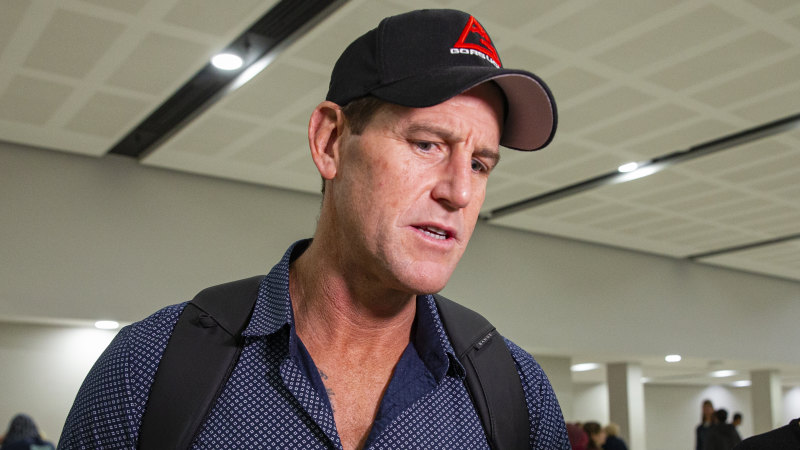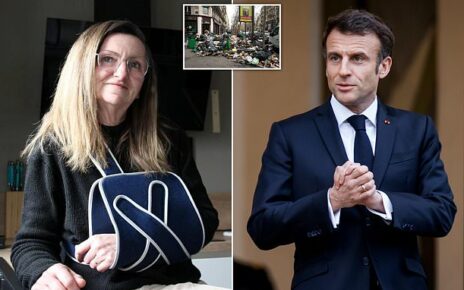Save articles for later
Add articles to your saved list and come back to them any time.
Former SAS corporal Ben Roberts-Smith knew he had committed the murders described in a series of news articles, so should pay all the costs of running the defamation proceedings he brought against three newspapers, the media’s lawyer has argued before the Federal Court.
Roberts-Smith has accepted he is liable for the millions of dollars of costs accumulated in the marathon war crimes case after the date of a settlement offer he rejected on March 18, 2020.
Ben Roberts-Smith outside a bankruptcy lawyer in Perth on June 29 – the day he agreed to pay the costs of his defamation trial.Credit: Nine
However, the lawyer for the newspapers, Nicholas Owens, SC, told the court on Monday that Roberts-Smith should have never brought the case, and should pay the costs from August 2018, when he first sued.
The total cost of the case is estimated at $25 million and the newspapers will argue that Roberts-Smith’s key backers at Seven West Media should ultimately pay the costs.
Roberts-Smith’s lawyer, Arthur Moses, SC, countered that the newspapers were “not entitled” to write stories about war crimes committed by the decorated soldier because he was entitled to the presumption of innocence.
Owens told Justice Anthony Besanko – who found resoundingly in favour of the media outlets in the defamation case in June – that Roberts-Smith had sued The Age, The Sydney Morning Herald and the Canberra Times for defamation, knowing that “the fundamental premise” of his case was false.
Nicholas Owens SC is representing the newspapers.Credit: AAP
“Your honour was presented with a case that was either true or false to the applicant’s knowledge,” Owens said. “He was the moving party to the litigation … he was the person who brought this whole thing into existence.”
Owens said Roberts-Smith had given a “positive account” of his actions, spent a week being cross-examined over it, called witnesses over a month, and disputed allegations from the newspapers’ witnesses over three months, all the while taking the “knowingly false position” that he had not committed the murders reported.
This was the “classic definition of an abuse of process”, Owens said, because the time of the court had been invoked “to achieve an injustice, that is a result that a party knows is based on a lie”.
“It corrupts the whole process of what happens after that because it involves bringing forward of false evidence … it involves a public and … vehement challenge to the honesty and reliability of witnesses that your honour knew were fundamentally honest, and it means the whole conduct of the litigation becomes a waste of both court and party time and money,” Owens said.
Arthur Moses, SC, the lawyer for Roberts-Smith.Credit: Anna Kucera
Under those circumstances, he said, the newspapers deserved to be compensated for the full cost of the litigation, because they bore the burden of proving their reports had been true.
If the court disagreed, Owens said, the newspapers should receive their costs from the time that Roberts-Smith had rejected a “generous” settlement offer to walk away from the litigation – each side paying their own costs – in June 2019.
Moses argued, however, that Roberts-Smith should only have to pay the full costs if he had prolonged the case unduly with “groundless contentions,” and if his case had been doomed to fail.
Roberts-Smith had brought the case, according to Moses, because of the “provocation” by the newspapers that he was a “war criminal who had assaulted a woman”, and it was “not for them” to suggest he was a criminal.
Roberts-Smith was in an “invidious position”: he could either “allow the publications to continue and trash his presumption of innocence or … protect his rights,” Moses said.
The reports of allegations of war crimes were “not investigative journalism,” he added, because they were already being investigated by the Inspector-General of the Australian Defence Force.
“The media were not entitled to go around publishing these articles in the situation where he was entitled to the presumption of innocence,” Moses said.
Owens countered that the presumption of innocence “does not operate as some overriding prohibition on the publication of material and therefore it cannot be used as an argument justifying why Mr Roberts-Smith chose to commence these proceedings”.
Besanko reserved his decision and said he would deliver it in the “near future”.
Our Breaking News Alert will notify you of significant breaking news when it happens. Get it here.
Most Viewed in National
From our partners
Source: Read Full Article






